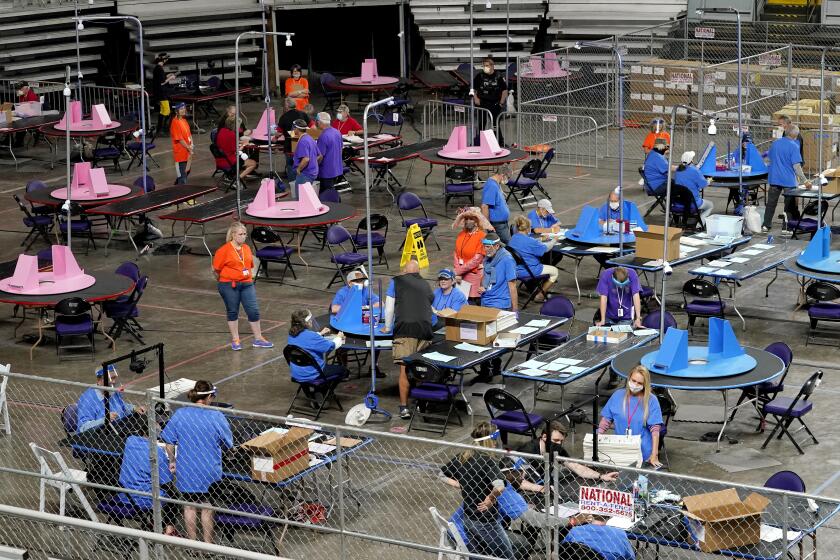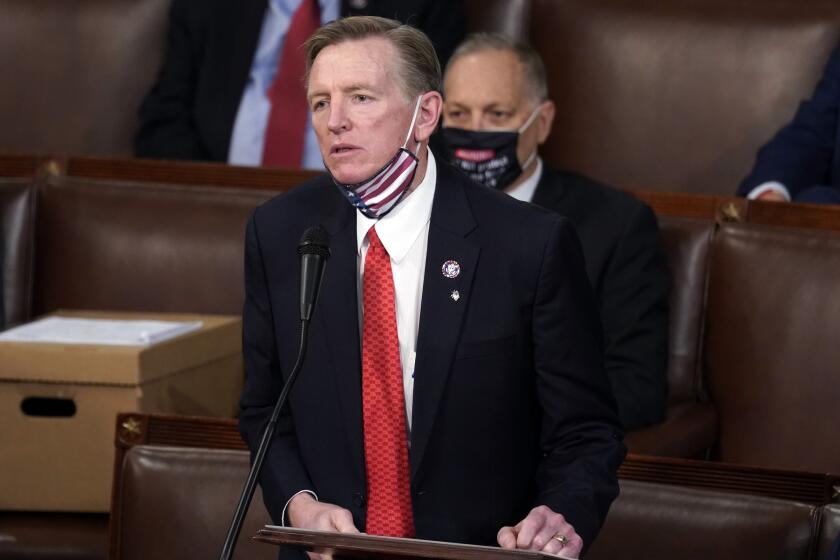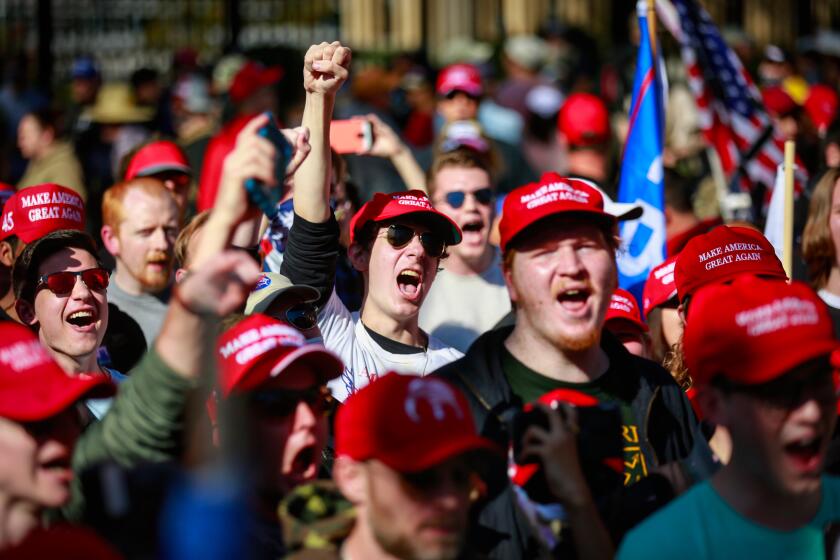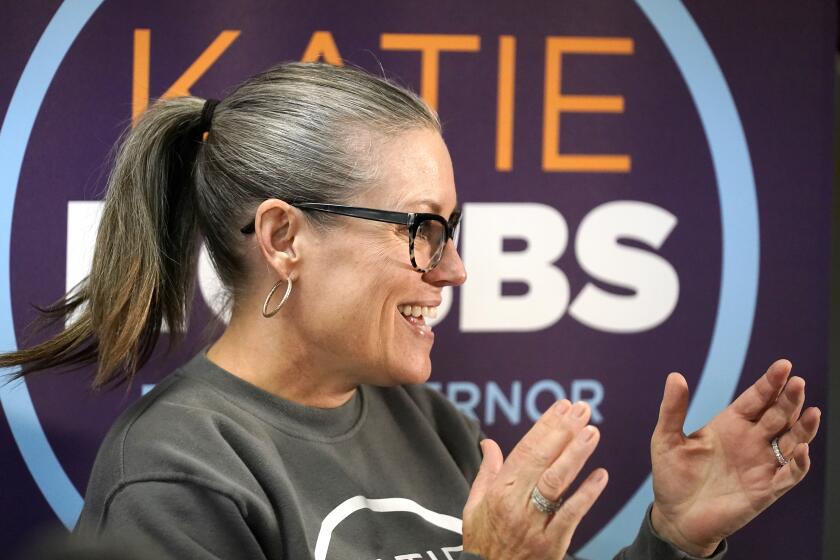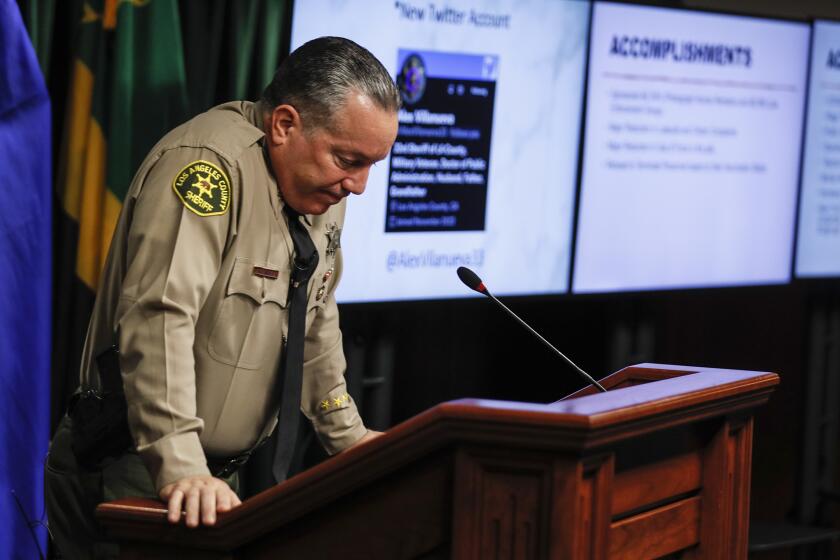Column: Is Arizona paving ‘the road to authoritarianism’ with its slate of GOP election deniers?
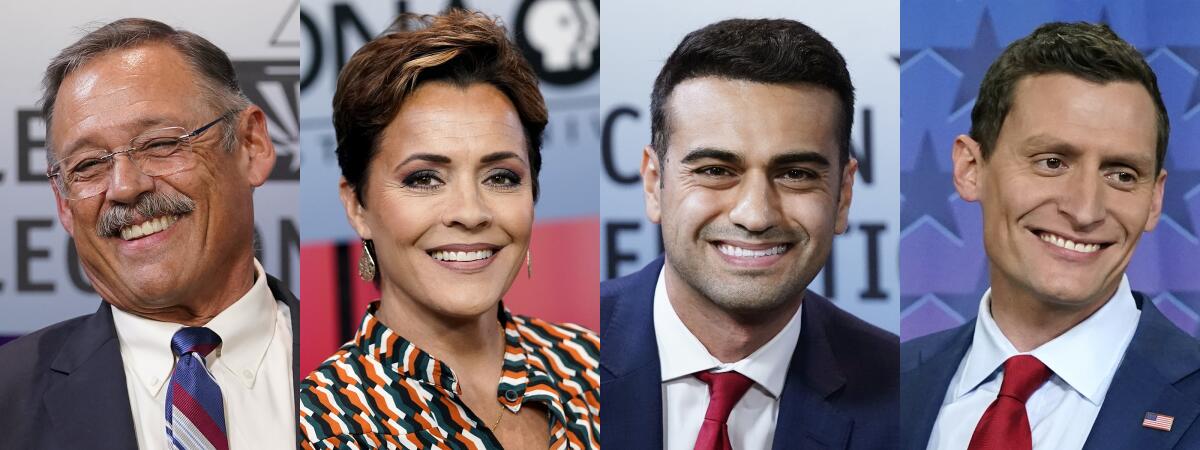
ORO VALLEY, Ariz. — On a recent weekday morning, Steve Arechiga swung by the library to pick up a book he’d reserved. It was a history of authoritarian strongmen, starting with Mussolini. The topic seemed unnervingly immediate.
Arechiga is a political independent. He’s so concerned, however, about the falsehoods promoted by four of Arizona’s statewide Republican candidates — the claim President Biden stole the White House, the lie that the 2020 election was rife with fraud — that Arechiga has been going door to door in this upscale Tucson suburb campaigning for Democrats.
It’s bad enough, he said, that candidates like gubernatorial nominee Kari Lake and Senate hopeful Blake Masters refuse to acknowledge President Trump’s defeat. Worse, Arechiga suggested, is what might come in 2024 if Lake and the GOP candidates for secretary of state, Mark Finchem, and attorney general, Abraham Hamadeh, seize hold of the state’s election machinery.
“Then you’ve got liars running the show. People who are in charge making decisions that suit themselves” said Arechiga, 69, who taught English as a second language before retiring. As he spoke, a steady stream of voters trickled in to drop off or cast early ballots at the public library, its slanted rooftop emulating the soaring peaks of the nearby Santa Catalina Mountains.

In a deeply divided nation, the one thing unifying Americans is a shared sense of unease. A vast majority believe the country is heading in the wrong direction, but fewer agree on why that is — and which political party is to blame.
This occasional series, America Unsettled, examines the complicated reasons behind voters’ decisions in this momentous and unpredictable midterm election.
“I just think that’s the road to authoritarianism,” Arechiga went on, “People saying, ‘We’re going to do it our way and everyone else gets pushed aside that doesn’t agree with us.’ That’s the fear I have.”
After the unprecedented storming of the U.S. Capitol on Jan. 6 and Trump’s relentless peddling of his stolen-election fable, it seemed the fate of democracy itself would be central to the debate this ragged campaign season.
With a few exceptions — Senate races in Nevada and Utah, the gubernatorial election in Pennsylvania, a handful of other contests where culprits in the insurrection are running — that hasn’t been the case.
But nowhere is there an election-denier slate like in Arizona.
The state has always had an ornery streak. Now many Republicans are denying reality for Trump’s sake.
The state is not immune from soaring inflation, rising interest rates and the dour economic forecasts that have tanked Biden’s approval ratings and pushed Democrats back on their heels, imperiling the party’s control of the House and Senate. By some accounts, prices have risen faster here than anywhere in the country and, not surprisingly, inflation was generally the first thing voters spoke of when asked what they had on their minds.
But in more than two dozen conversations in Tucson, the Phoenix suburbs and points between, many brought up Trump and the election deniers who have parroted his lies and baseless conspiracy theories.
Travis Brady insisted, in a voice dripping with disdain, that the 2020 balloting “was fine, there was nothing wrong with it” and Lake and others suggesting the contrary have served only to embarrass Arizona.
“The fact that these politicians, the ones that are Trump endorsed, are already saying the elections this year are rigged, they’re the ones that are undermining election confidence more than anybody else ever could,” said Brady, 52, a political independent who teaches culinary arts to high schoolers in Casa Grande. (Lake, who is well known as a longtime Phoenix television news anchor, won’t promise to accept the result if she loses.)
“I just can’t support that,” Brady said.
In many ways, Arizona lies at the heart of the still-roiling fight over 2020.
When Fox News called the state for Biden it sent Trump into an election night rage, undermining his plans to prematurely declare victory and bolster his bogus claim to a second term. Leaders of the state GOP filed one of many fruitless lawsuits aimed at overturning the election, and two of Arizona’s Republican congressmen helped promote the rally that ended in the attack on Congress.
Finchem was among those attending the rally. More recently he defended self-appointed election monitors — some masked and wearing tactical gear — menacing voters near ballot drop boxes, saying it was perfectly fine for them to carry weapons.
The family of Arizona Rep. Paul Gosar is torn apart by his extremist views
But it was sometimes hard, when talking to voters, to discern that something crucial and deeply fundamental is at stake next Tuesday. The sanctity of free and fair elections — the bedrock this country rests upon — was often lumped together with other issues as just another wedge dividing partisans of red and blue America.
Democrats expressed alarm at the prospect of Arizona being run by elected officials with such a cavalier attitude toward elections and the truth.
“Whether the person you want wins or not, you’ve got to accept it,” said Felicia Lee, 57, who works in customer relations for a cellphone company. The Phoenix resident shook her head vigorously, her big hoop earrings swaying, at the mention of Lake and, even more so, Finchem. “That’s the danger with them in charge. Things could get ugly.”
Republicans accused Democrats of fear-mongering and suggested they were perfectly willing to cheat whenever it suits their interests.
Merle Turner, who voted a straight Republican ticket for November, responded to questions about election denialism by bringing up Hillary Clinton, who won the popular vote but lost to Trump in the electoral college. “There was fraud in the 2016 election,” Turner insisted, echoing the former president’s claim. “But mainstream publications ignored that.”
As the 74-year-old physician left a barbershop in Chandler, one of Phoenix’s endless suburbs, he had a question of his own. “Hunter Biden,” Turner said, naming the son of the president who has a history of addictions and shady business dealings. “Why isn’t he in jail?”
For Jerry and Linda Briggs, conservatives from Casa Grande, there is absolutely no doubt the 2020 election was fraudulent.
“We’ve seen a documentary,” said Linda Briggs, 74, referring to “2,000 Mules,” a propaganda film that claims left-wing groups and ballot-stuffing “mules” conspired to steal victory from Trump. “They have proof.”
“It makes you stop and think about a lot of stuff,” added Jerry Briggs, 75.
As further evidence, the retired couple cited a technical error that resulted in up to 6,000 voters in Maricopa County recently receiving a mail ballot listing only federal races. Although the problem was fixed, and the flawed ballots reached just a tiny fraction of the Phoenix area’s 2.6 million voters, it only went to show “there has to be fraud,” Linda Briggs said, because things “aren’t done right in the first place.”
Kari Lake was a television news anchor in Phoenix for decades. Now, the Arizona gubernatorial candidate bashes the media as propagandists and uses her on-air savvy to rally Trump supporters.
The Democrats running — incumbent U.S. Sen Mark Kelly, Secretary of State Katie Hobbs for governor, Adrian Fontes for secretary of state and Kris Mayes for attorney general — have all rejected claims of a rigged 2020 election, promising to protect voting integrity.
If they prevail, it will be in part because of voters like Raul Martinez.
He’s not particularly happy with the status quo. “Nowadays everything costs more,” Martinez said, as he headed to the grocery store in Casa Grande. “Gas prices, food prices.”
He spends close to $200 a week gassing up his cherry-red Toyota Tacoma, which the 47-year-old Martinez pilots between his home in Phoenix and a mechanical engineering job nearly 50 miles away in Casa Grande.
The desert community used to be a rural outpost, reliant on farming and retirees, but it’s increasingly attracted those priced out of Phoenix and Tucson, which lies 70 miles south. Huge tracts of desert have given way to earth-toned subdivisions, dotted with palo verde and pint-sized cacti, and streets named after Indian tribes.
Martinez had an eye on building his own place, ending the long commute, but soaring interest rates may have priced it out of his range. “For the average blue-collar guy, it’s really hard to make a living,” Martinez said.
His frustration caused the longtime Democrat to question his loyalty to the party and consider whether a vote for Lake, Masters and other Republicans might bring about change. But their assertions of a stolen election give him pause.
“Very far-fetched,” Martinez said of the corrosive claims. “They’re not going down the right path with that.”
He’s right. Arizona faces a dangerous road on Nov. 8.
More to Read
Get the latest from Mark Z. Barabak
Focusing on politics out West, from the Golden Gate to the U.S. Capitol.
You may occasionally receive promotional content from the Los Angeles Times.

